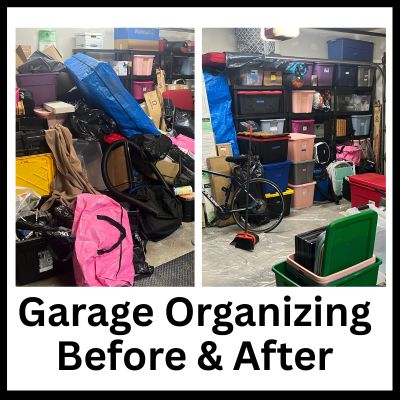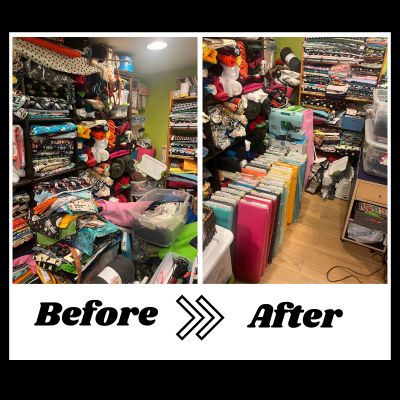Are You Ready For Change?

Have you felt defeated and frustrated when trying to reach your goals? Do you doubt your ability to sustain new routines? Have you tried setting boundaries for yourself, only to find that you engage in the behavior you’re trying to avoid even more than before? Do you find yourself filling in your time with “urgent” to-dos, so that you can hide your procrastination behind productivity? Do you find yourself caught in a “restrict-binge-shame” cycle? For the neuro-divergent population, accomplishing goals can be even more challenging than it is for neuro-typical folks. If you’re wanting to make lasting change in any area of your life, keep reading.
The reason it’s so much harder for neuro-divergent people is mostly (but not entirely) due to the pre-frontal cortex (PFC) of the brain. Neuro-divergent people often have trouble accessing their PFC. The PFC is where executive functioning happens. Executive functioning skills are important for time management, task initiation/completion, emotional regulation, prioritization and organization and more. When someone experiences executive dysfunction, it means that their executive functioning skills are inhibited. Executive dysfunction is usually related to the PFC, but dysfunction can also be influenced by the limbic system. The limbic system is the area of the brain where emotions are processed and memories are formed and stored.
Change happens in different stages, and by identifying which stage you’re in, it can help you foster empathy for yourself, which is the real ticket to creating lasting change.
As part of my continuing education studies, I recently attended a really interesting talk by Life Skills Advocate, a company that provides executive functioning coaching. They talked about the “transtheoretical model of change”. This model consists of:
- Precontemplation
- Contemplation
- Preparation/Determination
- Action
- Relapse (not always, of course!)
- Maintenance
What do these stages mean?
Precontemplation Stage
If you’re in the precontemplation stage, you may not be aware that there is an issue, and you’re not taking steps to change. Friends and family may be trying to push you into hiring a home organizer or coach, but you’re not making progress because you don’t think you need to have help. You’re probably not engaged in the process either, because “what’s the point?”. You don’t intend to take action now or for the foreseeable future. You don’t think what you’re doing is problematic, and you don’t see the negative consequences of your actions. You’re probably underestimating the benefits of changing your behavior and overestimating how hard it will actually be to make a change.
Contemplation Stage
In the contemplation stage, you’re starting to reach out to others and are looking for understanding. Since change can feel so overwhelming, you definitely don’t want to feel forced to make any big moves. You’re intending to start the healthy behavior relatively soon, and may have started doing a little research on how to make things happen. You may be checking out some websites of local home organizers, or watching YouTube videos about how to get organized.
Preparation/Determination Stage
Your fire is stoked! You are READY to take action within the next 30 days. You KNOW that behavior change consists of many small steps, and you believe that you have the power to make the changes you need to do to create a healthier and more productive life. You’ve either scheduled a call with a home organizer, have enlisted a friend to come help, or you have a solid DIY plan to get your home organized.
Action Stage
You’ve changed your behavior and intend on sticking with it moving forward. You’re actively in the process of getting organized, and the end is in sight. Wahoo!
Relapse Stage
While this stage doesn’t always occur, it’s important to remember that positive change happens on a spiral. Sometimes you may feel that the spiral is slanting downwards, but you’re actually moving upwards. It’s a hard concept for me to put in writing, but think of it like when you have to drive downhill when you’re traveling north. If you’ve relapsed, remember that you’ve done nothing wrong, it’s just part of the process. You may have disrupted the balance of the number of things you’re letting into your home versus the amount that are leaving. Or perhaps your acquisition habits are still in check, but your closets and cabinets have lost their sense of organization. Whatever has happened, you can recover.
Maintenance Stage
When you’ve sustained your new behavior for over 6 months and you intend to maintain the change going forward, you’re in the maintenance stage. You still may work to prevent relapses, but the idea of totally relapsing is becoming much more distant. You feel confident about the new habit you’ve created for yourself. Your home may get a little disorganized at times, but you are able to wrangle the mess with ease and grace.
Some important things to remember
- If you’re experiencing a lot of avoidance towards creating a new habit, you may not be in full alignment with wanting to create the habit. The benefits of sticking with the old habit still outweigh the benefits of starting a new habit, and that’s ok. Consider this metaphor. When you’re at the gym, you choose weights or exercises so that you can strengthen certain muscles. By sticking with your old habits, what lessons are you still learning?
- If you notice yourself using a lot of “shoulds”, these are red-flags that you might not be ready to make that level of change in your life right now. Slow down and stop “shoulding” on yourself. Trust that you will make the change when you are emotionally and physically ready to do so.
- If you’ve decided that you’re not ready to make a change just yet, use curiosity rather than judgement. Allow that part of yourself who’s not ready to make a change yet to have a voice. Listen to what it has to say. It’s probably a little scared due to something that’s happened in the past.
- Practice cultivating empathy towards yourself. This is usually a lifelong practice for people. If you hear yourself saying things like, “I can’t believe I did that!”, or “I am so stupid, why did I make that mistake?”, or “I’m so lazy! Why can’t I get my a$$ in gear?”, notice your thought and change your thought pattern. I’ve noticed that just by saying, “What if?” with a smile on my face, I’m able to break a negative thought pattern. Even better is asking yourself a positive “what if” question, like, “what if everything is working out just fine?”. If you’re in the throes of negative thinking, sometimes it can be hard to access a full positive “what if” question. Stick with something short and sweet (like the plain “what if?” with a smile) works wonders.
- Use words like “experiment” to help avoid resistance. If you try restricting yourself too much, a scarcity mindset will set in, and you’ll end up sabotaging yourself.
- Neural pathways are strengthened over time. If you’re creating a new habit, you’re probably going to need to redirect your habitual patterns a few times (or more) before they become reflexive.
- It may sound cliché, but develop your mindfulness practice. There are many ways to do it, but meditation (whether guided or to white noise/nature sounds) is one of the fastest and most efficient ways to get your PFC activated. It also helps your ability to observe and reflect on your actions. You’ll have an easier time making a distinction between what’s within your control and what’s beyond your control.

By Jean Prominski, Certified Professional Organizer
Check out my media exposure: Seattle Sparkle in the Media
Download my free 5 week journal The Seattle Sparkle Method to Get Organized and Stay Organized
Sign up for my free 4 Day Color to Declutter Challenge.
Become part of a like-minded community by joining my Facebook Group, Declutter and Organize with Seattle Sparkle.
Ready to book a consultation? Complete this form.
For artwork to energize your home, order through jeanprominski.com or on Etsy.




